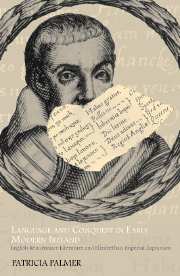 Language and Conquest in Early Modern Ireland
Language and Conquest in Early Modern Ireland Book contents
- Frontmatter
- Contents
- Acknowledgements
- List of abbreviations
- Introduction
- Chapter 1 Conquest, colonial ideologies and the consequences for language
- Chapter 2 ‘A bad dream with no sound’: the representation of Irish in the texts of the Elizabethan conquest
- Chapter 3 ‘Wilde Speech’: Elizabethan evaluations of Irish
- Chapter 4 ‘Translating this kingdom of the new’: English linguistic nationalism and Anglicisation policy in Ireland
- Chapter 5 New world, new incomprehension: patterns of change and continuity in the English encounter with native languages from Munster to Manoa
- Chapter 6 The clamorous silence
- Conclusion
- Glossary
- Notes
- Bibliography
- Index
Chapter 5 - New world, new incomprehension: patterns of change and continuity in the English encounter with native languages from Munster to Manoa
Published online by Cambridge University Press: 22 September 2009
- Frontmatter
- Contents
- Acknowledgements
- List of abbreviations
- Introduction
- Chapter 1 Conquest, colonial ideologies and the consequences for language
- Chapter 2 ‘A bad dream with no sound’: the representation of Irish in the texts of the Elizabethan conquest
- Chapter 3 ‘Wilde Speech’: Elizabethan evaluations of Irish
- Chapter 4 ‘Translating this kingdom of the new’: English linguistic nationalism and Anglicisation policy in Ireland
- Chapter 5 New world, new incomprehension: patterns of change and continuity in the English encounter with native languages from Munster to Manoa
- Chapter 6 The clamorous silence
- Conclusion
- Glossary
- Notes
- Bibliography
- Index
Summary
She complimented me
in a language I didn't know;
but when she blew cigar smoke
into my ears and nostrils
I understood, like a dog,
although I can't speak it yet.
Elizabeth Bishop, ‘The Riverman’, Works, p. 106When Ralegh, in his History of the World, reflected on the incomprehension that lay behind the haphazard naming of the New World, he did so with the weary knowingness of a new historicist. In seeking to disentangle geographical fact from ‘fantastical opinion’, he turned to linguistics, sceptically unpicking false etymologies as part of his empirical method. He dismissed the ‘fancy’ that identified Ophir/Parvaim with Peru. The latter was less a placename than a misunderstanding:
the Spaniards vtterly ignorant of that language, demaunding by signes (as they could) the name of the Countrie, and pointing with their hand athwart a riuer … the Indians answered Peru which was either the name of that brooke, or of water in generall.
He rejected Montanus' claim that Yucatan was biblical Joctan with the same philological incisiveness: ‘Iucatan, is nothing else in the language of that Countrie, but [What is that?] or [What do you say?] For when the Spaniards asked the name of that place (no man conceiuing their meaning) one of the Saluages answered Iucatan (which is) What ask you, or What say you?’ (p. 175).
- Type
- Chapter
- Information
- Language and Conquest in Early Modern IrelandEnglish Renaissance Literature and Elizabethan Imperial Expansion, pp. 148 - 172Publisher: Cambridge University PressPrint publication year: 2001


